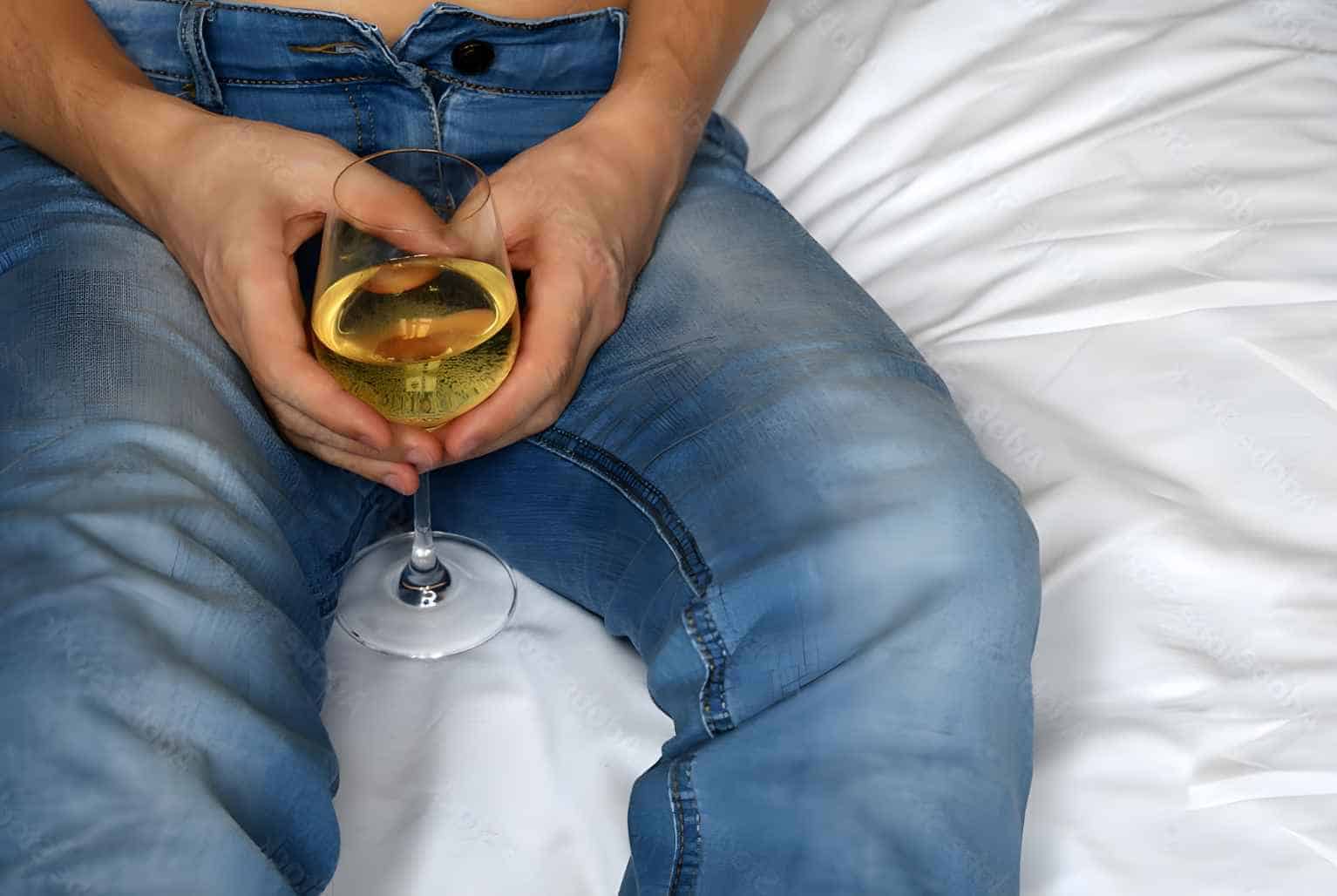Introduction

The connection between wine and libido has been a topic of intrigue and speculation for many years. People have often wondered if wine has the ability to enhance sexual desire and performance. In this article, we aim to separate fact from fiction and explore the scientific evidence behind wine’s effect on libido. By examining research studies and debunking misconceptions, we seek to provide a comprehensive understanding of the relationship between wine and sexual appetite. It is important to approach this topic with an open mind and rely on scientific evidence to form an informed perspective.
Background On The Connection Between Wine And Libido
Throughout history, wine has been closely associated with romance, passion, and sensuality. The connection between wine and libido can be traced back to ancient times, where it was believed that wine had the power to enhance sexual desire. This belief stems from the notion that wine acts as a social lubricant, helping individuals relax and feel more at ease in intimate situations. Wine’s reputation as an aphrodisiac has been perpetuated through literature, art, and cultural traditions. However, it is important to approach this connection with skepticism and rely on scientific research to understand the true effects of wine on libido.
The Purpose Of The Article: Separating Fact From Fiction
The purpose of this article is to separate fact from fiction when it comes to the connection between wine and libido. There are many beliefs and myths surrounding this topic, and it is important to rely on scientific research to understand the true effects of wine on sexual desire. By examining the scientific evidence, debunking common misconceptions, and exploring other factors that influence libido, this article aims to provide readers with a balanced and informed perspective. It emphasizes the importance of making informed choices and prioritizing moderation when it comes to consuming alcohol.
The Science Behind Wine’s Effect On Libido

Alcohol, including wine, has the ability to reduce inhibitions and promote relaxation, which may contribute to an increased sense of arousal and desire. However, the specific effects of wine on libido are not fully understood. Scientific studies have shown mixed results, with some suggesting a positive correlation between moderate wine consumption and sexual function, while others indicate no significant impact. It is important to note that individual differences, tolerance levels, and other factors can influence the relationship between wine and libido. Ultimately, more research is needed to fully understand the science behind wine’s effect on sexual desire.
The Role Of Alcohol In Reducing Inhibitions
The consumption of alcohol has long been associated with reduced inhibitions and increased sociability. When consumed, alcohol affects the central nervous system, leading to a decrease in anxiety and a sense of relaxation. This can lower inhibitions and potentially increase a person’s willingness to engage in certain behaviors, including sexual activity. Alcohol can also enhance feelings of pleasure and decrease self-consciousness, which may contribute to a heightened sense of arousal. However, it is important to note that while alcohol can lower inhibitions, it does not necessarily increase sexual desire or performance. The effects of alcohol on sexual behavior can vary greatly depending on individual tolerance and other factors.
Research On Wine’s Impact On Sexual Desire And Performance
Research on wine’s impact on sexual desire and performance has yielded mixed results. Some studies suggest that moderate wine consumption may positively affect sexual function and desire, particularly in women. This could be due to the potential role of antioxidants and flavonoids present in wine, which may have beneficial effects on blood flow and cardiovascular health. However, it is important to note that these studies are limited in scope and more research is needed to draw definitive conclusions. It is also crucial to consider individual differences and the potential negative effects of excessive alcohol consumption on sexual function.
The Myth Of The Aphrodisiac Qualities Of Wine

There is a common misconception that wine possesses aphrodisiac qualities and can enhance sexual desire. However, this belief is not supported by scientific evidence. While alcohol may lower inhibitions and create a relaxed mood, it does not directly increase libido or arousal. The perceived effects of wine on libido may be more attributed to psychological factors, such as the association of wine with romance and sensuality. It is important to separate fact from fiction when it comes to the aphrodisiac qualities of wine and approach the topic with a critical mindset.
Debunking The Misconception Of Wine As A Libido-boosting Substance
Contrary to popular belief, there is no scientific evidence to support the idea that wine has aphrodisiac qualities or directly boosts libido. While alcohol may create a relaxed mood and lower inhibitions, it does not increase sexual desire. Any perceived effects of wine on arousal are likely attributed to psychological factors, such as the association of wine with romance and sensuality. It is important to approach the notion of wine as a libido-boosting substance with a critical mindset and understand that its effects on arousal are more likely to be subjective rather than scientifically proven.
Exploring The Psychological Factors That May Contribute To The Perceived Effect
Psychological factors play a significant role in the perceived effect of wine on libido. The association of wine with romance, relaxation, and indulgence can create a psychological link between wine consumption and heightened sexual desire. This connection is reinforced by societal messages and cultural norms that portray wine as a sensual and aphrodisiac beverage. Additionally, individuals may experience a placebo-like effect, where their belief that wine increases libido leads to a subjective enhancement of arousal. However, it is important to recognize that these factors are subjective and vary from person to person.
Potential Risks And Side Effects Of Consuming Wine

Excessive consumption of wine can lead to various negative effects on sexual function. Alcohol is a central nervous system depressant that can impair arousal, decrease erectile function, and delay or inhibit orgasm. Chronic heavy drinking can also contribute to long-term sexual problems, such as decreased libido and erectile dysfunction. It is important to consume wine in moderation and be aware of its potential adverse effects on sexual health. Responsible drinking includes setting limits, understanding personal tolerance, and prioritizing overall well-being. Always consult a healthcare professional for personalized guidance.
Negative Effects Of Excessive Alcohol Consumption On Sexual Function
Excessive alcohol consumption can have a detrimental impact on sexual function. Alcohol is a central nervous system depressant that can impair arousal, decrease erectile function, and delay or inhibit orgasm. It can also disrupt hormone production and affect the body’s ability to maintain sexual desire and performance. Chronic heavy drinking can lead to long-term sexual problems, such as decreased libido and erectile dysfunction. It is important to be aware of the potential negative effects of excessive alcohol consumption on sexual health and to make responsible choices when consuming alcohol.
The Importance Of Moderation And Responsible Drinking
Moderation and responsible drinking are crucial when it comes to enjoying wine and maintaining a healthy sexual function. Excessive alcohol consumption can lead to a range of negative effects on sexual desire, arousal, and performance. It is essential to set limits on alcohol intake and to be mindful of one’s own tolerance levels. Practicing responsible drinking habits can help prevent the long-term consequences of heavy alcohol use on sexual health, such as decreased libido and erectile dysfunction. Prioritizing moderation ensures that individuals can enjoy wine in a way that supports both their physical and sexual well-being.
Other Factors Influencing Libido

Exploring other factors impacting sexual desire
In addition to alcohol consumption, there are various other factors that can influence libido. These factors include:
- Stress: High levels of stress can significantly impact sexual desire and performance. Stress can increase cortisol levels in the body, which can disrupt hormonal balance and decrease libido.
- Hormonal balance: Imbalances in hormones such as testosterone, estrogen, and progesterone can affect sexual desire. Hormonal changes due to age, certain medications, or medical conditions can have an impact on libido.
- Overall health: General health and well-being play a crucial role in sexual function. Chronic illnesses, certain medications, and lifestyle factors like poor diet and lack of exercise can all contribute to a decrease in libido.
- Mental and emotional factors: Psychological factors such as depression, anxiety, relationship issues, and body image concerns can also affect libido.
Understanding and addressing these various factors can help individuals identify and address any potential underlying issues that may be affecting their sexual desire. It’s important to consult with a healthcare professional to discuss any concerns and develop an appropriate plan for managing and improving libido.
Exploring Other Factors Impacting Sexual Desire
There are various other factors that can influence libido, in addition to alcohol consumption. One significant factor is stress, as high levels of stress can disrupt hormonal balance and decrease sexual desire. Hormonal imbalances, whether due to age, medications, or medical conditions, can also affect libido. General health and well-being play a crucial role, with chronic illnesses, certain medications, poor diet, and lack of exercise all potentially contributing to a decrease in libido. Additionally, mental and emotional factors such as depression, anxiety, relationship issues, and body image concerns can also impact sexual desire. Understanding and addressing these factors are essential for managing and improving libido.
The Role Of Stress, Hormonal Balance, And Overall Health
Chronic stress can have a significant impact on libido, as it disrupts the delicate balance of hormones in the body. When stress levels are high, the body produces an excess of cortisol, which can lower libido. Additionally, imbalances in hormone levels, whether due to age, medications, or medical conditions, can also affect sexual desire. It is important to prioritize stress management techniques such as exercise, relaxation exercises, and seeking support from loved ones. Taking care of overall health, including maintaining a balanced diet and regular exercise routine, can also positively impact sexual desire and overall well-being.
Conclusion

In conclusion, the belief that wine can make you horny is not supported by scientific evidence. While alcohol may temporarily reduce inhibitions and make some individuals feel more open to sexual experiences, it actually acts as a depressant that can impair sexual function, including libido and erectile function. It is important to approach the topic of wine and libido with caution and prioritize moderation in alcohol consumption. Making informed choices that prioritize personal health and well-being is key.
Summarizing The Findings And Key Points Discussed
The findings of this article indicate that there is no scientific evidence to support the claim that wine or any other alcoholic beverage can make a person horny. While alcohol may temporarily reduce inhibitions and make some individuals feel more open to sexual experiences, it actually acts as a depressant that can impair sexual function, including libido and erectile function. It is important to approach the topic of wine and libido with caution and prioritize moderation in alcohol consumption. Making informed choices that prioritize personal health and well-being is key.
Promoting A Balanced And Informed Perspective On The Topic
Promoting a balanced and informed perspective on the topic is crucial when discussing the effects of wine on libido. It is important to approach the subject with caution and prioritize moderation and individual differences. While some evidence suggests potential benefits, it is essential to consider the negative effects of excessive alcohol consumption on sexual function. Furthermore, understanding that alcohol acts as a depressant and can impair libido and erectile function is necessary. By making informed choices that align with personal health and well-being, individuals can navigate the topic of wine and libido more responsibly.
FAQ: Does Wine Make You Horny?
Q: Does wine make you horny?
A: The relationship between wine and libido is a complex and subjective topic. While some people may experience increased sexual desire after consuming wine, it is important to note that alcohol affects individuals differently, and the correlation between wine and sexual arousal varies among individuals.
Q: Are there any scientific studies supporting the claim that wine increases libido?
A: While some studies suggest that moderate alcohol intake can enhance sexual desire, there is currently limited scientific research specifically on the effects of wine in relation to libido. It is essential to approach such claims with caution and keep in mind that personal experiences may differ.
Q: Why do some people feel more amorous after drinking wine?
A: The presence of alcohol in the body can lead to an initial feeling of relaxation and increased confidence. This, coupled with the wine’s sensory qualities, such as its aroma and taste, can contribute to a more sensual atmosphere, potentially enhancing one’s mood and desire for intimacy.
Q: What is the difference between moderate and excessive alcohol consumption regarding sexual arousal?
A: Consuming alcohol in moderation may lead to temporary feelings of relaxation and lowered inhibitions, potentially enhancing desire and sexual experiences for some individuals. However, excessive alcohol consumption can have adverse effects, including decreased sexual function and performance difficulties.
Q: Can wine be considered an aphrodisiac?
A: An aphrodisiac is defined as a substance that increases sexual desire. While some people may perceive wine as an aphrodisiac due to its sensory appeal and potential impact on mood, no scientific evidence conclusively supports this claim. It’s important to remember that individual experiences may vary.
Q: Are there any risks associated with relying on alcohol to enhance sexual experiences?
A: Yes, it’s crucial to exercise caution when relying on alcohol as a means to enhance sexual experiences. Overconsumption of alcohol can impair judgment and decision-making, leading to risky behaviors and regrettable choices. It is always best to prioritize open communication, consent, and a respectful approach to intimacy.
Q: Are there any alternatives to exploring increased sexual desire other than alcohol consumption?
A: Absolutely! While some individuals may find alcohol consumption to be a part of their intimate experiences, there are various alternatives to explore increased sexual desire, such as open communication with your partner, stress reduction techniques, exercise, a healthy diet, and incorporating new experiences into your relationship.
Q: Can drinking wine improve sexual performance?
A: There is no scientific evidence to suggest that drinking wine, or any other alcoholic beverage, can improve sexual performance. Factors such as overall well-being, emotional connection, and understanding between partners typically play more critical roles in sexual satisfaction and performance.
Remember, it’s always wise to practice moderation and prioritize open communication and mutual consent when it comes to exploring intimacy and desire. If you have concerns regarding your sexual health, it is advisable to consult a healthcare professional or a specialist.

Frog Bear & Wild Boar is a vibrant and dynamic establishment located at 343 N Front St. in the heart of the Arena District in Columbus, OH. Our story began with a passion for creating an inviting and lively environment where friends, families, and colleagues can come together to enjoy great food, refreshing drinks, and fantastic entertainment. Founded on the principles of warm hospitality, delicious cuisine, and a commitment to community, Frog Bear & Wild Boar has become a beloved gathering place for locals and visitors alike. Our dedication to delivering exceptional experiences has earned us a reputation for being a go-to destination for memorable outings and special occasions.